- Home
- Leslie Meier
British Manor Murder
British Manor Murder Read online
Books by Leslie Meier
MISTLETOE MURDER
TIPPY TOE MURDER
TRICK OR TREAT MURDER
BACK TO SCHOOL MURDER
VALENTINE MURDER
CHRISTMAS COOKIE MURDER
TURKEY DAY MURDER
WEDDING DAY MURDER
BIRTHDAY PARTY MURDER
FATHER’S DAY MURDER
STAR SPANGLED MURDER
NEW YEAR’S EVE MURDER
à BAKE SALE MURDER
CANDY CANE MURDER
ST. PATRICK’S DAY MURDER
MOTHER’S DAY MURDER
WICKED WITCH MURDER
GINGERBREAD COOKIE MURDER
ENGLISH TEA MURDER
CHOCOLATE COVERED MURDER
EASTER BUNNY MURDER
CHRISTMAS CAROL MURDER
FRENCH PASTRY MURDER
CANDY CORN MURDER
BRITISH MANOR MURDER
EGGNOG MURDER
Published by Kensington Publishing Corporation
A Lucy Stone Mystery
BRITISH MANOR MURDER
LESLIE MEIER
KENSINGTON BOOKS
www.kensingtonbooks.com
All copyrighted material within is Attributor Protected.
KENSINGTON BOOKS are published by
Kensington Publishing Corp.
119 West 40th Street
New York, NY 10018
Copyright © 2016 by Leslie Meier
All rights reserved. No part of this book may be reproduced in any form or by any means without the prior written consent of the Publisher, excepting brief quotes used in reviews.
Library of Congress Card Catalogue Number: 2016945054
Kensington and the K logo Reg. U.S. Pat. & TM Off.
ISBN: 978-0-7582-7710-7
First Kensington Hardcover Edition: October 2016
eISBN-13: 978-0-7582-7712-1
eISBN-10: 0-7582-7712-1
First Kensington Electronic Edition: October 2016
VD1_1
Table of Contents
Also by
Title Page
Copyright Page
Dedication
Chapter One
Chapter Two
Chapter Three
Chapter Four
Chapter Five
Chapter Six
Chapter Seven
Chapter Eight
Chapter Nine
Chapter Ten
Chapter Eleven
Chapter Twelve
Chapter Thirteen
Chapter Fourteen
Chapter Fifteen
Chapter Sixteen
Chapter Seventeen
Chapter Eighteen
Chapter Nineteen
Chapter Twenty
Epilogue
Eggnog Murder
About the Author
For Stella Rose
Chapter One
“If only they’d send a ransom note,” wailed Lucy Stone, pulling her old gray cardigan tighter across her chest. “Then at least we’d have a chance of getting Patrick back.”
Looking out the kitchen window this early March morning she saw the same wintry scene she’d been staring at since Christmas: an endless expanse of snow several feet deep, punctuated here and there with bare black branches. There was a complete absence of color, just like her life since her five-year-old grandson Patrick had been snatched away from her.
“He wasn’t kidnapped, Lucy,” reminded her husband Bill. “He’s with his parents.”
“In Alaska,” replied Lucy, making it sound as if Alaska was located on the moon.
Actually, she thought to herself, the moon might be closer to the little Maine town of Tinker’s Cove than Alaska, which seemed impossibly far away.
“Toby’s building his career,” said Bill, referring to his son, Patrick’s father. “He has to go where there’s work and this was too good to pass up—a full-time government job in fisheries management . . . with excellent benefits.”
Lucy gazed at Bill, her husband of more than twenty years. He looked the same as always, tall and fit, dressed in the working man’s winter uniform of plaid flannel shirt, lined jeans, and sturdy work boots, but now his beard was frosted with gray. As usual, he was being entirely reasonable.
“I know,” she admitted, “but I don’t see why they had to take Patrick. They left him with us when they went to Haiti,” she said, getting to the crux of the problem. Patrick had lived with his grandparents for nearly four months before Christmas, while his parents, Toby and Molly, had gone to Haiti where Toby completed a graduate-level study of fish farming practices. Lucy had adored spending time with her only grandchild, reliving the days when she was a young mother herself.
“Alaska is not Haiti,” said Bill.
“It’s practically the frontier,” grumbled Lucy. “And all this moving around is very disruptive for a child. Kids need stability. They need to be in one place.”
“He’s in the right place. With his parents.”
Lucy did not like hearing this, even if it was the truth, and was quick to retaliate. “They’re not Patriots fans in Alaska,” she said, naming New England’s beloved football team. “Patrick’s probably a Seahawks fan by now.”
Bill looked stunned, hearing this heresy spoken. “Toby would never let that happen.”
Lucy raised her eyebrows. “It’s hard to resist group pressure. He’s probably already got a Seahawks hat or jersey.” She paused, then went for the jugular. Invoking the name of the Patriots’ quarterback, she said, “He probably doesn’t even remember Tom Brady.”
This didn’t get the reaction from Bill that Lucy expected. Instead of fussing and fuming, he sat down opposite her at the round golden oak table. “I know you’re joking, Lucy, but the truth is you really haven’t been yourself since Patrick left.” He reached across the table and took her hands in his. “This can’t go on, Lucy. You’ve got to pull yourself together. You’ve got to think of Sara and Zoe,” he said, naming their two daughters who were still at home. Their oldest daughter, Elizabeth, like her brother Toby, had already flown the nest; she was living in Paris and working at the tony Cavendish Hotel there.
Lucy thought guiltily of Zoe, who was in her senior year of high school, and was waiting anxiously for the college acceptance—or rejection—letters that should arrive any day now. Zoe prided herself on being independent and had written the essays all by herself, refusing help from her parents, but Lucy wondered uneasily if she should have insisted on getting more involved. The truth was that she took Zoe at her word that it was all under control, simply because she hadn’t felt like arguing after working all day as a reporter for the local weekly newspaper, the Pennysaver.
As for Sara, who was a student at nearby Winchester College, well, Lucy had to admit she didn’t even know what courses Sara was taking this term or if she was still dating Hank, someone she had met at the college dive club. She was rarely home these days. Lucy assumed she was deeply involved in college life, but she hadn’t taken the trouble to find that out, either.
Lucy was uneasily aware that she hadn’t been much of a mother lately or even much of a wife, and the worst of it was that she didn’t care. She was operating on automatic. She dragged herself out of bed in the morning when the alarm rang, drank her coffee, and ate her oatmeal. Then she drove to work, where she dutifully put in her time but found the work she used to enjoy so much as a part-time reporter and feature writer had become merely tedious. The worst part of the day came later, after she went home and cooked supper, cleaned up the kitchen, and sat herself down in front of the TV. The shows came and went, but she couldn’t say what she was watching. She was only waiting until it was time to go to bed, and bedtime seemed to come a
bit earlier every night.
“I’m sorry,” she said, brushing away a tear. “I’m just so sad. I miss Patrick.”
“Don’t cry,” said Bill. “There’s been enough crying. Too much crying.”
“I’m sorry,” sobbed Lucy as he slid the tissue box across the table to her. She pulled out a handful and wiped her face, giving him a weak smile. “I’m going to try harder. I really am.”
“Good,” said Bill, exhaling a big sigh and standing up. “Don’t forget. It’s coffee-klatch Thursday.”
Lucy propped her chin on her hand. “I don’t know . . .” she began, thinking that she’d have to comb her hair and get dressed and put on some lipstick. Then there were the boots and jacket and scarf and hat and gloves she’d have to wear. And she’d have to brush the two or three inches of new snow that had fallen during the night off the car. It all seemed so hard. She had the morning off because Thursday was the day the Pennysaver came out. Since she wasn’t needed at the office she could go back to bed, which was what she was planning to do as soon as Bill left for work.
“C’mon, Lucy. You promised to try harder,” he said, reading her mind. “I’m not leaving until I see you washed and dressed and in the car. You better hurry or you’ll be late,” he added, glancing at the clock. “I’ll clear the snow off your car while you get ready. Is that a deal?”
Lucy glowered at him, then pressed her hands on the table and stood up. “Deal,” she muttered, narrowing her eyes.
* * *
Lucy was late but only by a few minutes when she got to Jake’s Donut Shack and found her three friends already seated at their usual table. They had first met as young mothers, bumping into each other frequently at school and sports events, but as their kids grew older and those encounters became fewer, they agreed to meet every Thursday for breakfast. They’d kept up the tradition for years, celebrating the good times and supporting each other through the bad.
“Hi, Lucy,” said Pam Stillings, welcoming her. Pam had not only retained the ponytail and colorful poncho she’d worn as a teen, but she’d also retained the enthusiasm and positive outlook she’d exhibited as a college cheerleader. It was her unshakable optimism that helped explain her success as the wife of a small town newspaper editor in a time of rising expenses, dwindling subscribers, and increased competition for advertisers. Her husband Ted was Lucy’s boss.
“How are you doing?” asked Rachel Goodman as Lucy sat down but neglected to remove her parka. Rachel’s dark eyes were full of concern as she put one hand on Lucy’s shoulder and with the other gave Lucy’s zipper a tug; she was a psych major in college and never got over it. Her husband Bob had a busy law practice in town.
Taking the hint, Lucy unzipped her parka and removed her hat and gloves, dropping them on the table.
“They’re still having winter clearance sales at the outlet mall,” said Sue Finch, eyeing Lucy’s tired winter gear. “I saw some cute hats and scarves at fifty percent off in that ski shop.” Sue was the group’s fashionista, always smartly turned out despite her occasional stints as a substitute teacher at Little Prodigies, the childcare center she owned in partnership with Chris Cashman. Sue’s husband Sid owned a custom closet company, which he claimed he’d had to do just to keep up with Sue’s ever-expanding wardrobe.
” I’m doing okay,” said Lucy. “We Skyped last night and Patrick was so cute. He said—” She stopped abruptly, choking up.
“What did he say?” asked Rachel as the three friends exchanged concerned glances.
Lucy sniffed. Taking the tissue Sue offered, she wiped her eyes. “He said he missed reading stories with me.”
“Skype is so amazing,” said Pam. “You could read stories to him on it.”
“It’s not the same without the physical contact,” said Lucy. “I really miss snuggling with him. Who knows? Next time I see him he may be too big for cuddles. They grow up so fast.”
“Let’s order,” said Sue, waving over Norine, the waitress. “I’m beginning to get the shakes.”
“What do you mean? The shakes? You never eat anything,” said Pam.
“I need more coffee,” said Sue, indicating her empty mug.
“The usual for everybody?” inquired Norine, filling their mugs. “Black coffee for Sue, granola and yogurt for Pam, a sunshine muffin for Rachel, and hash and eggs for Lucy.”
“Just coffee for me,” said Lucy, reversing years of Thursday breakfast choices with a sigh. “I can’t face a big plate of eggs this morning.”
Norine cocked her head. “You sure?”
“Maybe some toast,” said Lucy.
“Okay,” said Norine, sounding rather doubtful.
When she’d gone, Rachel glanced at the others and, getting encouraging nods, plunged right in. “Lucy, we know how much you miss Patrick, but we really think you need to get some . . . um . . . help.”
Somewhat stunned, Lucy realized this was something her friends had discussed and agreed upon.
“We think you’re in danger of slipping into a serious depression,” continued Rachel.
“Just because I don’t want a greasy meal this morning doesn’t mean I’m depressed,” said Lucy, protesting. “Maybe I’m not hungry.”
“You haven’t been yourself lately,” said Pam. “Even Ted has noticed.”
“She’s right,” said Sue, chiming in. “When was the last time you washed and styled your hair? Or put on a lick of lipstick?”
“I guess I forgot this morning,” said Lucy. “I was tired. Really tired.”
“Tiredness is a symptom of depression,” said Rachel.
“Or of being busy,” countered Lucy.
“You don’t need to get defensive,” said Rachel. “We want to help you.”
“You can beat this,” said Pam. “For one thing, you could try my yoga class. We work to realign our chakras and restore the proper mind-body-spirit connection. A lot of people find it very helpful and I have some openings in my six AM Monday-Wednesday-Friday class.”
“I don’t think so,” said Lucy. “I’m not very coordinated.”
“You don’t have to be athletic to enjoy yoga,” insisted Pam. “It’s not competitive. That is not the point at all. The poses are very adaptable. I have quite a few students with physical handicaps. That’s the great thing about yoga—you do what you’re comfortable with. You get to know your body.”
“My body likes to lie down,” said Lucy, getting a chuckle from the group.
“We do that!” exclaimed Pam. “At the end of the session, there’s breathing. Everybody lies on their mats and some people even fall asleep.”
“I don’t think I need a class to fall asleep,” said Lucy with a big yawn. “I can do that all on my own.”
“Yoga is definitely one approach you can use to combat depression,” said Rachel, “but based on what you’re saying, especially about being tired all the time and wanting to sleep so much, I think you could really do with some therapy.”
“Therapy?” exclaimed Lucy. “You think I’m crazy?”
“Crazy is such a loaded word,” said Rachel. “Think of mental health as a sort of spectrum. One end is bright and sunny and happy and the other end is dark and disorganized and troubled, with lots of various shades in between. We all travel back and forth along this spectrum during our lifetimes, depending on many factors. The teens, for example, tend to be rather a difficult time for most, and oddly enough, recent research seems to show that old age is actually a pretty happy time for most.”
“So give me a few more years,” said Lucy, looking up as Norine arrived with their orders.
“Normally, I’d say there’s nothing wrong with Lucy that some shopping wouldn’t cure,” said Sue, taking a sip of coffee, “but this time I think something rather more drastic is called for.”
“Not a makeover,” said Lucy, frowning at the plate of buttery toast triangles that Norine had plopped down in front of her.
“They won’t bite,” said Norine, adding a big sniff for emphasis.
“Not a makeover,” said Sue, giving her a once over. “But come to think of it, that’s not a bad idea. No, I have something else in mind. A change of scene. Big time.”
“Not Florida,” said Lucy, naming the usual winter break destination. She picked up one of the toast triangles and took a small bite.
“Why not?” asked Pam. “Florida is great. It’s warm and sunny and there are all those theme parks and spring training baseball games.”
“One word,” said Lucy. “Alligators.”
“Ah, interesting,” said Rachel, sounding like a comical impersonation of a Freudian analyst. “Alligators can summon up primal fears from the subconscious, reminding us of the monsters we feared in childhood.”
“Except the monsters weren’t real and alligators are,” said Lucy, opening the little plastic packet of marmalade and spreading it on her toast.
“Well there are no alligators where I’m going,” said Sue. “I’ve been invited by Perry—”
“That guy you met in London at the V and A?” asked Pam, recalling an incident that took place a few years earlier when the four friends had taken a trip together to England. “The one with the hats?”
“Righto,” said Sue. “As you may remember, the Victoria and Albert Museum had a special exhibit of hats that year and that’s where I met Perry and discovered a shared enthusiasm. He is the Earl of Wickham and has invited Sid and me to come visit him at his ancestral home, Moreton Manor. He’s putting on a big exhibition of his hat collection and asked me to donate a few pieces. I inherited a couple of Lily Dache originals from my grandma, you know. So to make a long story short, he’s invited me to bring my hats and my husband. Sid doesn’t want to go so I asked his lordship if I could bring a friend and he said, ‘Why ever not? We’ve got a hundred and twenty rooms.’ So there it is, Lucy. You know how much you loved England when we went there a couple years ago.”

 Christmas Card Murder
Christmas Card Murder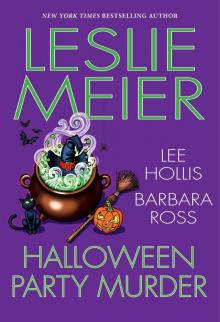 Halloween Party Murder
Halloween Party Murder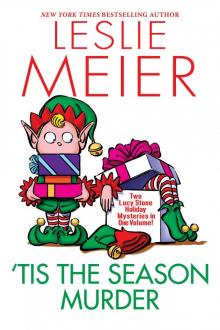 'Tis the Season Murder
'Tis the Season Murder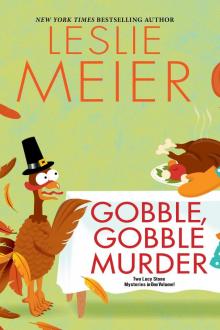 Gobble, Gobble Murder
Gobble, Gobble Murder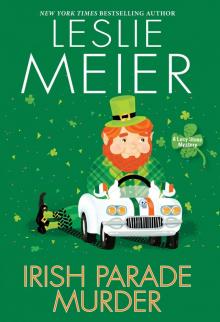 Irish Parade Murder
Irish Parade Murder Bake Sale Murder
Bake Sale Murder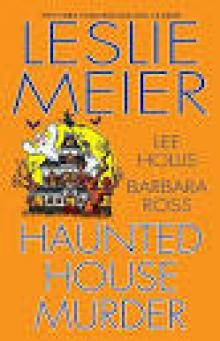 Haunted House Murder
Haunted House Murder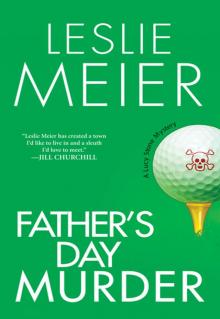 Father’s Day Murder
Father’s Day Murder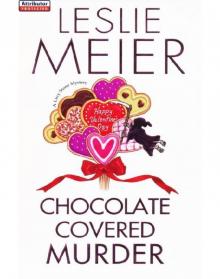 Chocolate Covered Murder
Chocolate Covered Murder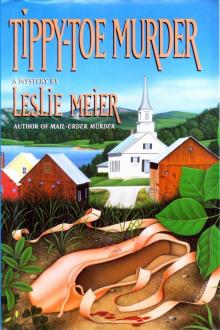 Tippy Toe Murder
Tippy Toe Murder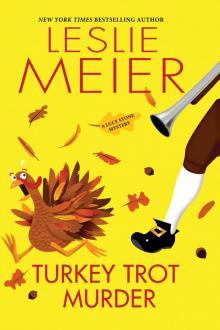 Turkey Trot Murder
Turkey Trot Murder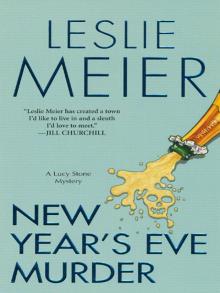 New Year's Eve Murder
New Year's Eve Murder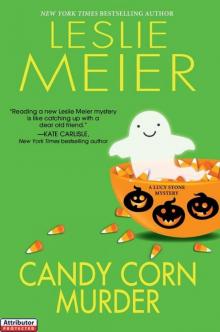 Candy Corn Murder
Candy Corn Murder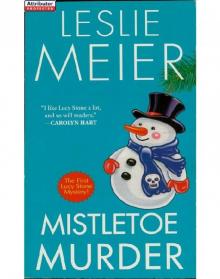 Mistletoe Murder
Mistletoe Murder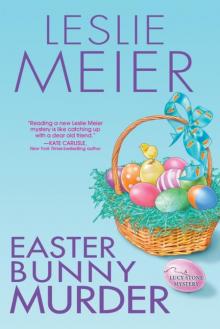 LStone 20 - Easter Bunny Murder
LStone 20 - Easter Bunny Murder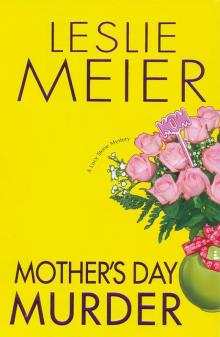 Mother's Day Murder
Mother's Day Murder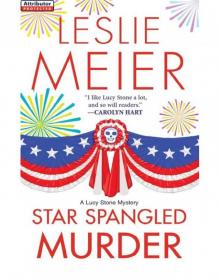 Star Spangled Murder
Star Spangled Murder Silver Anniversary Murder
Silver Anniversary Murder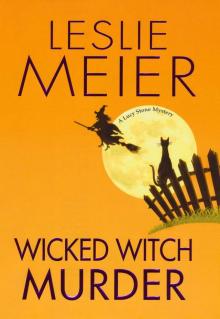 Wicked Witch Murder
Wicked Witch Murder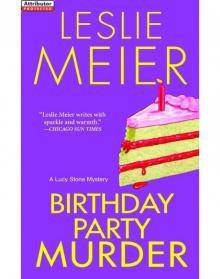 Birthday Party Murder
Birthday Party Murder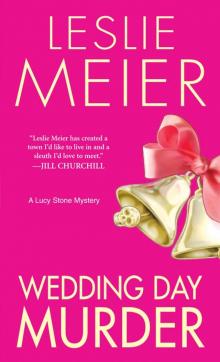 Wedding Day Murder
Wedding Day Murder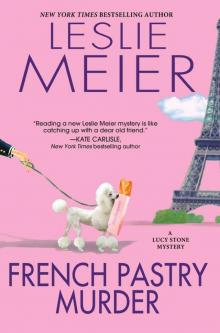 French Pastry Murder
French Pastry Murder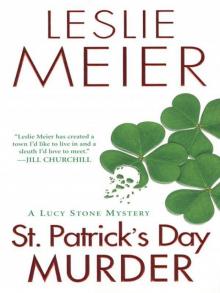 St. Patrick's Day Murder
St. Patrick's Day Murder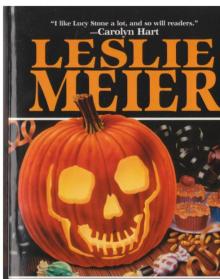 Trick or Treat Murder
Trick or Treat Murder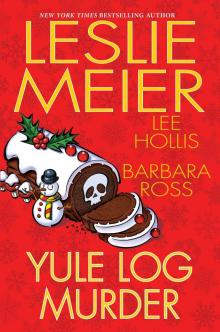 Yule Log Murder
Yule Log Murder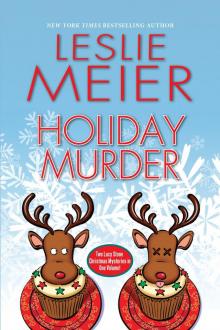 Holiday Murder
Holiday Murder British Manor Murder
British Manor Murder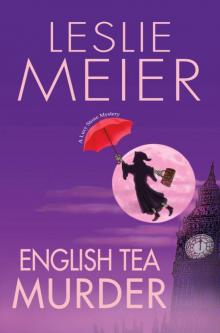 English Tea Murder
English Tea Murder